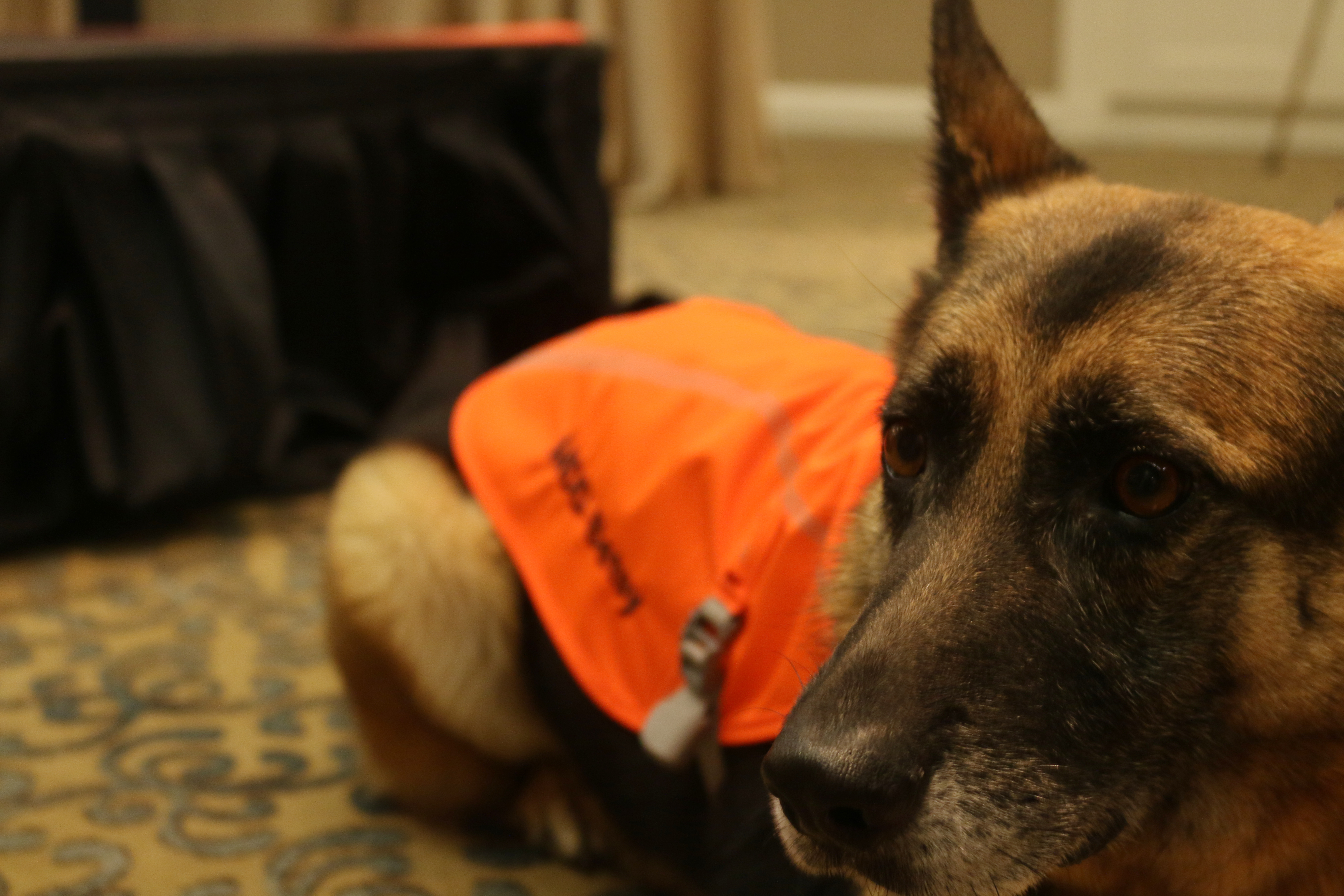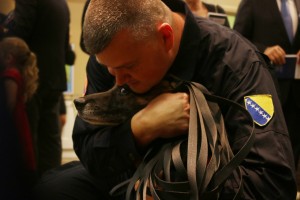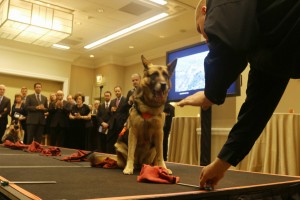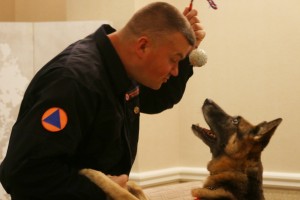WASHINGTON — When Betsy, a 7-year-old landmine-sniffing dog from Bosnia-Herzegovina, made her trip into the U.S. to receive an award for saving lives, she was offered the treatment a hero deserves — a trip to a luxury canine resort.
Her trainer, Alden Cesko, wanted a room too.
“Of course,” said Cesko, who never left Betsy’s side and shared a posh room with her. “It’s my girl.”
Cesko trained mine detection dog Betsy to sniff for high explosives, sitting and pointing her nose to signal a discovery. She wakes up with Cesko at 4 or 5 in the morning and takes tests promptly at 6 to make sure her detection abilities are 100 percent. She’s a Belgian Malinois — perked ears, black face and light brown body — who has cleared 240,000 square meters since she started searching for landmines in 2009.
But she and Cesko took a break from landmine clearing to spend Wednesday night celebrating their selection as trainer-dog team of the year at the nonprofit Marshall Legacy Institute’s annual gala, receiving acclaim for protecting hundreds of thousands of Bosnian residents.
Cesko’s dedication — and the bond they share — won Betsy the “top dog” award, says Sead Vrana, an official in Bosnia-Herzegovina.
“The handler — that’s what makes the difference,” says Vrana, chief of explosive ordinance disposal at the Federation of Bosnia & Herzegovina Civil Protection, who is much more comfortable in his field uniform than in his suit. “They love each other. I’m witnessing that every day.”
Vrana said there were about 200,000 to 300,000 landmines in Bosnia-Herzegovina as of 2009, the latest estimate. He said 30 percent of the Bosnia-Herzegovina population lives on or surrounds the landmines, with 2.1 million square meters of land left to clear.
In 1996 the U.S. had stationed 16,500 troops in Bosnia-Herzegovina to help NATO allies stabilize the region after the Bosnian War, according to the Congressional Research Service.
After three years of war, the U.S. Army estimated more than 750,000 mines had been planted in the country by warring groups, jeopardizing soldiers’ lives. Some military authorities said the landmines were a “greater threat to U.S. personnel than the former warring factions,” according to the Army, noting that landmines caused about one-third of UN Protective Force casualties.
Today more than 700 Army National Guard troops remain only in Kosovo. Bosnia-Herzegovina is the fifth most-funded country by the State Department, which provided $97 million from fiscal 1993 to 2013, according to the Bureau of Political-Military Affairs.
Landmine Monitor estimated there were 73,576 casualties and hundreds of thousands injured worldwide from mines, explosive remnants of war and victim-activated improvised explosive devices between 1999 and 2009.
MD dogs clear an average of 600 square meters a day, and Bosnia-Herzegovina has five dogs at work to find those landmines, with two more slated to arrive next week. The MLI, an organization focused on de-mining war-torn countries, has sponsored 199 dogs for training worldwide. Training costs $20,000.
Dogs are an effective way of removing mines because of their accuracy, efficiency and reduction in casualties, experts said. Since the program began 17 years ago, no dog or handler has been injured or killed.
There are, however, some limitations; the dogs can’t cover mountain terrain, and the longer a mine stays in the ground, the deeper it becomes and the harder to detect.
It takes about $20,000 to $40,000 a year to sustain each dog, Vrana said. In return, he added, they’re expected to clear at least 50,000 square meters every year.
The Belgian Malinois, a sheepherding dog, is popular for police and military purposes. Its work ethic and intelligence makes it an easy species to train.
“She’s the most important part of the whole process,” Vrana said of Betsy.
But Betsy and Cesko didn’t notice being the center of attention. Cesko was kneeling and playing with his partner as the crowd surrounded them.




